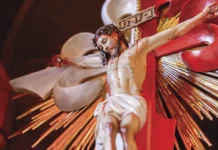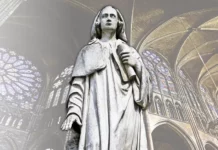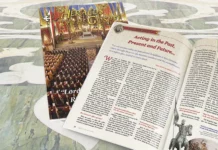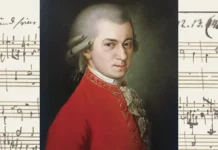In several countries in Africa, Christians are being persecuted and killed for professing their faith, based on the Law of God and on the teachings of the Church, while we quietly enjoy “pseudo-normality”…
On hearing the word martyrs, we are reminded of the Christians who in the past shed their blood for the Faith, especially in Rome. The Colosseum comes to mind, the enormous amphitheatre with its arena filled with blessings, the scene of so many holocausts during the first persecutions of the Church; events both sinister and magnificent. The image of the podium arises in our imagination, the platform from which the imperial authorities watched the spectacle of human beings being devoured by beasts. Without doubt, the suffering of those first witnesses was mystically united with that of Christians from all centuries.
Men and women offered their lives, resisting the pressure of the pagan environment that surrounded them, in order to remain unshakably faithful to the grace of conversion that they had received on coming to know the Holy Church. Refusing to burn incense to idols was a crime punishable by being thrown to the beasts.
A manifestation of faith and nobility
In this regard, I recall the beautiful words that the founder of the Heralds of the Gospel, Msgr. João Scognamiglio Clá Dias, wrote as a meditation when he visited the Coliseum in February 1993. I transcribe below some extracts from the delightful literary prose:
“I am writing to you right next to the dais where the emperors stood to revel in the destruction of the bodies of the martyrs, in the central and most important place for spectators in this historic, terrible and grandiose Coliseum. From here I can witness, in my memory and imagination, countless martyrdoms. I see the Bishop St. Ignatius arriving from Antioch accompanied by a number of Christians whom he had converted and baptized along the way, from inside his vehicle: an iron cage.
“I see him now, as the object of scorn of those pagans, awaiting the tragic moment when the hungry beasts will be unleashed in the arena. The jeers, for him, represent nothing. On the contrary, they are an incentive for him to believe in the choirs of Angels and Saints who, beyond the walls of the apparent realities of this life, await him with a palm and a crown.
“A roar from the crowd, followed by silence and great suspense: the famished beasts burst into the arena and, impetuous, advance upon the pure and innocent victim to devour him.”1
Once the cruel slaughter was over, “then the gladiators entered, shackling those animals that had just satiated their bestial appetite with the flesh of a new seraphim. With the arena empty, the spectacle over, the audience slowly leaves, frustrated. What a manifestation of faith and nobility they had witnessed! The Christians remain there, waiting for sunset. And when the cloak of night covers the city of Rome, they enter the arena in search of the dust that has become a relic upon being soaked in the blood of the one who baptized them. […]
“This structure is evocative; each stone has a beautiful story to tell. Even the newest grass and moss would like to say a word about that past made of blood, pain and glory. […] O arena that was the pedestal of so many Blessed!”3
It is rightly said that “the blood of martyrs is the seed of Christians.”2
Millions – yes, millions – were reaped from this earth in the most horrific way in the first centuries of Christianity. And their blood paved the way for the conversion of many more to the true Faith.
“Part of a much greater drama”
Almost two thousand years have passed, throughout which there have been periods of religious persecution in various parts of the world, with the life-offering of those who refused to submit to pagan religions or atheistic ideologies, or that of Catholic missionaries in regions where they proclaimed the Gospel.
In this 21st century – so full of verbiage about human rights, the “respect” due to different “religions”, the “freedom” to adopt any ideology or rule of behaviour – we are confronted with situations that sadden us, fill us with indignation and make us reflect.
In our surroundings, even under the effects of an endless pandemic, we live in a tranquillity that could best be described as “pseudo-normality”. Carefree, we can go to the mall, the supermarket, the cinema, engage in a sport, walk in the streets, attend Mass and travel… For the moment, as Catholics, and even as believers, we do not face open opposition to our religious convictions.
Nevertheless, we cannot help but compare our situation with that of the Christians of several countries in Africa, who suffer a relentless persecution that leads inevitably to their death if they profess their Faith, founded on the Commandments of the Law of God and the teachings of the Church, especially if they are missionaries.
This is what is happening, for example, in Nigeria. According to the International Society for Civil Liberties and the Rule of Law, more than one thousand four hundred Christians were massacred by extremist groups in the first four months of 2021, breaking the macabre record of the highest number since the year 2014. The Pontifical Foundation Aid to the Church in Need also reports an increase in religious persecution in Africa.
Like a terrifying shadow over the Mystical Bride of Christ, these killings are added to those committed in other nations of the African continent: Cameroon, Chad, Kenya and Somalia. Regarding the execution of ten Christians on the day after Christmas, Bishop Matthew Hassan Kukah, Bishop of Sokoto, Nigeria, declared: “This is part of a much greater drama in which we live daily.”4
They are being mercilessly persecuted and killed, while we quietly enjoy “pseudo-normality”.
Solidarity, grief and indignant protest
Learning of such facts, we cannot remain in the same frame of mind. The lack of news coverage on this topic by the international information services – so quick to report certain types of events – is suspect. They seem blind and deaf to these terrible occurrences.
This is what leads me to express in this article – on my part and certainly on the part of many readers – my solidarity, my grief and my indignant protest at these murders of our brothers in the Faith in African lands. May these “martyrs of the 21st century,” their families and friends know that we are with them in heart.
From a distance, surrounded by our “comforts” – between quotations marks, for who can say for how much longer we shall have them – we send a greeting, a prayer and an embrace to our African heroes who suffer persecution from those who, demanding tolerance for their extremist religious or political ideas, act with the most obstinate intolerance towards those who hold the peace and joy of Christ Our Lord in their hearts.
May God grant that the blood of these martyrs be the seed of new Christians and produce an abundant harvest for His Kingdom. May Jesus and His Most Holy Mother accompany them! ◊
In featured photo: Martyrdom of St. Ignatius of Antioch – Basilica of St. Clement, Rome
Notes
1 CLÁ DIAS, EP, João Scognamiglio. O dom de sabedoria na mente, vida e obra de [The Gift of Wisdom in the Thought, Life and Work of] Plinio Corrêa de Oliveira. Città del Vaticano-São Paulo: LEV; Lumen Sapientiæ, 2016, v.V, p.354-355.
2 Idem, p.355-358.
3 TERTULLIAN. Apologeticum, 50: PL 1, 535.
4 EJECUCIÓN DE 10 CRISTIANOS EN NAVIDAD ES “PARTE DE UN DRAMA MÁS AMPLIO”, LAMENTA OBISPO [EXECUTION OF 10 CHRISTIANS AT CHRISTMAS IS “PART OF A MUCH GREATER DRAMA,” BISHOP LAMENTS]. In: www.aciprensa.com.







